- Home
- Neal Stephenson
The Diamond Age: Or, a Young Lady's Illustrated Primer Page 4
The Diamond Age: Or, a Young Lady's Illustrated Primer Read online
Page 4
Paralysis struck Bud's vocal cords, and he felt lightheaded, unable to concentrate.
“I gotta go,” his friend said, and removed himself from Bud's vicinity.
For the next few hours Bud felt as though everyone on the street was looking at him. Bud was certainly looking at them, looking for those suits, those colored strips of cloth. But he caught sight of a man in shorts and a T-shirt—a black man with very high cheeks, one of which was marked with a tiny scar, and almost Asian-looking eyes in a very high state of alertness. So he couldn't rely on the Ashanti wearing stereotyped clothing.
Very soon after that, Bud swapped clothes with an indigent down on the beach, giving up all his black leather and coming away with a T-shirt and shorts of his own. The T-shirt was much too small; it bound him under the armpits and pressed against his muscles so that he felt the eternal twitching even more than usual. He wished he could turn the stimulators off now, relax his muscles even for one night, but that would require a trip to the mod parlor, and he had to figure that the Ashanti had the mod parlors all staked out.
He could have gone to any of several brothels, but he didn't know what kind of connections these Ashanti might have—or even what the hell an Ashanti was, exactly—and he wasn't sure he could get a boner under these circumstances anyway.
As he wandered the streets of the Leased Territories, primed to level his Sights at any black person who blundered into his path, he reflected on the unfairness of his fate. How was he to know that guy belonged to a tribe?
Actually, he should have known, just from the fact that he wore nice clothes and didn't look like all the other people. The very apartness of those people should have been a dead giveaway. And his lack of fear should have told him something. Like he couldn't believe anyone would be stupid enough to mug him.
Well, Bud had been that stupid, and Bud didn't have a phyle of his own, so Bud was screwed. Bud would have to go get himself one real quick, now.
He'd already tried to join the Boers a few years back. The Boers were to Bud's kind of white trash what these Ashanti were to most of the blacks. Stocky blonds in suits or the most conservative sorts of dresses, usually with half a dozen kids in tow, and my god did they ever stick together. Bud had paid a few visits to the local laager, studied some of their training ractives on his home mediatron, put in some extra hours at the gym trying to meet their physical standards, even gone to a couple of horrific bible-study sessions. But in the end, Bud and the Boers weren't much of a match. The amount of church you had to attend was staggering—it was like living in church. And he'd studied their history, but there were only so many Boer/Zulu skirmishes he could stand to read about or keep straight in his head. So that was out; he wasn't getting into any laager tonight.
The Vickys wouldn't take him in a million years, of course. Almost all the other tribes were racially oriented, like those Parsis or whatever. The Jews wouldn't take him unless he cut a piece of his dick off and learned to read a whole nother language, which was a bit of a tall order since he hadn't gotten round to learning how to read English yet. There were a bunch of cœnobitical phyles—religious tribes—that took people of all races, but most of them weren't very powerful and didn't have turf in the Leased Territories. The Mormons had turf and were very powerful, but he wasn't sure if they'd take him as quickly and readily as he needed to be taken. Then there were the tribes that people just made up out of thin air—the synthetic phyles—but most of them were based on some shared skill or weird idea or ritual that he wouldn't be able to pick up in half an hour.
Finally, sometime around midnight, he wandered past a man in a funny gray jacket and cap with a red star on it, trying to give away little red books, and it hit him: Sendero. Most Senderistas were either Incan or Korean, but they'd take anyone. They had a nice clave here in the Leased Territories, a clave with good security, and every one of them, down to the last man or woman, was batshit. They'd be more than a match for a few dozen Ashantis. And you could join anytime just by walking in the gates. They would take anyone, no questions asked.
He'd heard it was not such a good thing to be a Communist, but under the circumstances he figured he could hold his nose and quote from the little red book as necessary. As soon as those Ashantis left town, he'd bolt.
Once he made up his mind, he couldn't wait to get there. He had to restrain himself from breaking into a jog, which would be sure to draw the attention of any Ashantis on the street. He couldn't bear the idea of being so close to safety and then blowing it.
He rounded a corner and saw the wall of the Sendero Clave four stories high and two blocks long, one solid giant mediatron with a tiny gate in the middle. Mao was on one end, waving to an unseen multitude, backed up by his horsetoothed wife and his beetle-browed sidekick Lin Biao, and Chairman Gonzalo was on the other, teaching some small children, and in the middle was a slogan in ten-meter-high letters: STRIVE TO UPHOLD THE PRINCIPLES OF MAO-GONZALO-THOUGHT!
The gate was guarded, as always, by a couple of twelve-year-old kids in red neckerchiefs and armbands, ancient bolt-action rifles with real bayonets leaning against their collarbones. A blond white girl and a pudgy Asian boy. Bud and his son Harv had whiled away many an idle hour trying to get these kids to laugh: making silly faces, mooning them, telling jokes. Nothing ever worked. But he'd seen the ritual: They'd bar his path with crossed rifles and not let him in until he swore his undying allegiance to Mao-Gonzalo-thought, and then—
A horse, or something built around the same general plan, was coming down the street at a hand-gallop. Its hooves did not make the pocking noise of iron horseshoes. Bud realized it was a chevaline—a four-legged robot thingy.
The man on the chev was an African in very colorful clothing. Bud recognized the patterns on that cloth and knew without bothering to check for the scar that the guy was Ashanti. As soon as he caught Bud's eye, he kicked it up another gear, to a tantivy. He was going to cut Bud off before he could reach Sendero. And he was too far away, yet, to be reached by the skull gun, whose infinitesimal bullets had a disappointingly short range.
He heard a soft noise behind him and swiveled his head around, and something whacked him on the forehead and stuck there. A couple more Ashantis had snuck up on him barefoot.
“Sir,” one of them said, “I would not recommend operation of your weapon, unless you want the round to detonate in your own forehead. Hey?” and he smiled broadly, enormous perfectly white teeth, and touched his own forehead. Bud reached up and felt something hard glued to the skin of his brow, right over the skull gun.
The chev dropped to a trot and cut toward him. Suddenly Ashantis were everywhere. He wondered how long they'd been tracking him. They all had beautiful smiles. They all carried small devices in their hands, which they aimed at the pavement, trigger fingers laid alongside the barrels until the guy on the chev told them otherwise. Then, suddenly, they all seemed to be aimed in his direction.
The projectiles stuck to his skin and clothing and burst sideways, flinging out yards and yards of weightless filmy stuff that stuck to itself and shrank. One struck him in the back of the head, and a swath of the stuff whipped around his face and encased it. It was about as thick as a soap bubble, and so he could see through it pretty well—it had peeled one of his eyelids back so he couldn't help but see—and everything now had that gorgeous rainbow tinge characteristic of soap bubbles. The entire shrink-wrapping process consumed maybe half a second, and then Bud, mummified in plastic, toppled over face-forward. One of the Ashantis was good enough to catch him. They laid him down on the street and rolled him over on his back. Someone poked the blade of a pocketknife through the film over Bud's mouth so that he could breathe again.
Several Ashantis set about the chore of bonding handles to the shrink-wrap, two up near the shoulders and two down by the ankles, as the man on the chev dismounted and knelt over him.
This equestrian had several prominent scars on his cheeks. “Sir,” the man said, smiling, “I accuse you of violating cert
ain provisions of the Common Economic Protocol, which I will detail at a more convenient time, and I hereby place you under personal arrest. Please be aware that anyone who has been so arrested is subject to deadly force in the event he tries to resist—which—ha! ha!—does not seem likely at present—but it is a part of the procedure that I am to say this. As this territory belongs to a nation-state that recognizes the Common Economic Protocol, you are entitled to a hearing of any such charges within the judicial framework of the nation-state in question, which in this case happens to be the Chinese Coastal Republic. This nation-state may or may not grant you additional rights; we will find out in a very few moments, when we present the situation to one of the relevant authorities. Ah, I believe I see one now.”
A constable from the Shanghai Police, legs strapped into a pedomotive, was coming down the street with the tremendous loping strides afforded by such devices, escorted by a couple of power-skating Ashantis. The Ashantis had big smiles, but the constable looked stereotypically inscrutable.
The chief of the Ashantis bowed to the constable and graciously spun out another lengthy quotation from the fine print of the Common Economic Protocol. The constable kept making a gesture that was somewhere between a nod and a perfunctory bow. Then the constable turned to Bud and said, very fast: “Are you a member of any signatory tribe, phyle, registered diaspora, franchise-organized quasi-national entity, sovereign polity, or any other form of dynamic security collective claiming status under the CEP?”
“Are you shitting me?” Bud said. The shrink-wrap squished his mouth together so he sounded like a duck.
Four Ashantis took the four handles and hoisted Bud off the ground. They began to follow the loping constable in the direction of the Causeway that led over the sea to Shanghai. “How 'bout it,” Bud quacked through the hole in the shrink-wrap, “he said I might have other rights. Do I have any other rights?”
The constable looked back over his shoulder, turning his head carefully so he wouldn't lose his balance on that pedomotive. “Don't be jerk,” he said in pretty decent English, “this is China.”
Hackworth's morning ruminations; breakfast and
departure for work.
Thinking about tomorrow's crime, John Percival Hackworth slept poorly, rising three times on the pretext of having to use the loo. Each time he looked in on Fiona, who was sprawled out in her white lace nightgown, arms above her head, doing a backflip into the arms of Morpheus. Her face was barely visible in the dark room, like the moon seen through folds of white silk.
At five A.M., a shrill pentatonic reveille erupted from the North Koreans' brutish mediatrons. Their clave, which went by the name Sendero, was not far above sea level: a mile below the Hackworths' building in altitude, and twenty degrees warmer on the average day. But whenever the women's chorus chimed in with their armor-piercing refrain about the all-seeing beneficence of the Serene Leader, it felt as if they were right next door.
Gwendolyn didn't even stir. She would sleep soundly for another hour, or until Tiffany Sue, her lady's maid, came bustling into the room and began to lay out her clothes: stretchy lingerie for the morning workout, a business frock, hat, gloves, and veil for later.
Hackworth drew a silk dressing gown from the wardrobe and poured it over his shoulders. Binding the sash around his waist, the cold tassels splashing over his fingers in the dark, he glanced through the doorway to Gwendolyn's closet and out the other side into her boudoir. Against that room's far windows was the desk she used for social correspondence, really just a table with a top of genuine marble, strewn with bits of stationery, her own and others', dimly identifiable even at this distance as business cards, visiting cards, note cards, invitations from various people still going through triage. Most of the boudoir floor was covered with a tatty carpet, worn through in places all the way down to its underlying matrix of jute, but hand-woven and sculpted by genuine Chinese slave labor during the Mao Dynasty. Its only real function was to protect the floor from Gwendolyn's exercise equipment, which gleamed in the dim light scattering off the clouds from Shanghai: a step unit done up in Beaux-Arts ironmongery, a rowing machine cleverly fashioned of writhing sea-serpents and hard-bodied nereids, a rack of free weights supported by four callipygious caryatids—not chunky Greeks but modern women, one of each major racial group, each tricep, gluteus, latissimus, sartorius, and rectus abdominus casting its own highlight. Classical architecture indeed. The caryatids were supposed to be role models, and despite subtle racial differences, each body fit the current ideal: twenty-two-inch waist, no more than 17% body fat. That kind of body couldn't be faked with undergarments, never mind what the ads in the women's magazines claimed; the long tight bodices of the current mode, and modern fabrics thinner than soap bubbles, made everything obvious. Most women who didn't have superhuman willpower couldn't manage it without the help of a lady's maid who would run them through two or even three vigorous workouts a day. So after Fiona had stopped breast-feeding and the time had loomed when Gwen would have to knacker her maternity clothes, they had hired Tiffany Sue—just another one of the child-related expenses Hackworth had never imagined until the bills had started to come in. Gwen accused him, half-seriously, of having eyes for Tiffany Sue. The accusation was almost a standard formality of modern marriage, as lady's maids were all young, pretty, and flawlessly buffed. But Tiffany Sue was a typical thete, loud and classless and heavily made up, and Hackworth couldn't abide her. If he had eyes for anyone, it was those caryatids holding up the weight rack; at least they had impeccable taste going for them.
Mrs. Hull had not heard him and was still bumping sleepily around in her quarters. Hackworth put a crumpet into the toaster oven and went out on their flat's tiny balcony with a cup of tea, catching a bit of the auroral breeze off the Yangtze Estuary.
The Hackworths' building was one of several lining a block-long garden where a few early risers were already out walking their spaniels or touching their toes. Far down the slopes of New Chusan, the Leased Territories were coming awake: the Senderos streaming out of their barracks and lining up in the streets to chant and sing through their morning calisthenics. All the other thetes, coarcted into the tacky little claves belonging to their synthetic phyles, turning up their own mediatrons to drown out the Senderos, setting off firecrackers or guns—he could never tell them apart—and a few internal-combustion hobbyists starting up their primitive full-lane vehicles, the louder the better. Commuters lining up at the tube stations, waiting to cross the Causeway into Greater Shanghai, seen only as a storm front of neon-stained, coal-scented smog that encompassed the horizon.
This neighborhood was derisively called Earshot. But Hackworth didn't mind the noise so much. It would have been a sign of better breeding, or higher pretentions, to be terribly sensitive about it, to complain of it all the time, and to yearn for a townhouse or even a small estate farther inland.
Finally the bells of St. Mark's chimed six o'clock. Mrs. Hull burst into the kitchen on the first stroke and expressed shame that Hackworth had beaten her to the kitchen and shock that he had defiled it. The matter compiler in the corner of the kitchen came on automatically and began to create a pedomotive for Hackworth to take to work.
Before the last bell had died away, the rhythmic whack-whack-whack of a big vacuum pump could be heard. The engineers of the Royal Vacuum Utility were already at work expanding the eutactic environment. The pumps sounded big, probably Intrepids, and Hackworth reckoned that they must be preparing to raise a new structure, possibly a wing of the University.
He sat down at the kitchen table. Mrs. Hull was already marmalading his crumpet. As she laid out plates and silver, Hackworth picked up a large sheet of blank paper. “The usual,” he said, and then the paper was no longer blank; now it was the front page of the Times.
Hackworth got all the news that was appropriate to his station in life, plus a few optional services: the latest from his favorite cartoonists and columnists around the world; clippings on various peculiar crac
kpot subjects forwarded to him by his father, ever anxious that he had not, even after all this time, sufficiently edified his son; and stories relating to the Uitlanders—a subphyle of New Atlantis, consisting of persons of British ancestry who had fled South Africa several decades previously. Hackworth's mother was an Uitlander, so he subscribed to the service.
A gentleman of higher rank and more far-reaching responsibilities would probably get different information written in a different way, and the top stratum of New Chusan actually got the Times on paper, printed out by a big antique press that did a run of a hundred or so, every morning at about three A.M.
That the highest levels of the society received news written with ink on paper said much about the steps New Atlantis had taken to distinguish itself from other phyles.
Now nanotechnology had made nearly anything possible, and so the cultural role in deciding what should be done with it had become far more important than imagining what could be done with it. One of the insights of the Victorian Revival was that it was not necessarily a good thing for everyone to read a completely different newspaper in the morning; so the higher one rose in the society, the more similar one's Times became to one's peers'.
Hackworth almost managed to dress without waking Gwendolyn, but she began to stir while he was stringing his watch chain around various tiny buttons and pockets in his waistcoat. In addition to the watch, various other charms dangled from it, such as a snuffbox that helped perk him up now and then, and a golden pen that made a little chime whenever he received mail.
“Have a good day at work, dear,” she mumbled. Then, blinking once or twice, frowning, and focusing on the chintz canopy over the bed: “You finish it today, do you?”
“Yes,” Hackworth said. “I'll be home late. Quite late.”
“I understand.”
“No,” he blurted. Then he pulled himself up short. This was it, he realized.

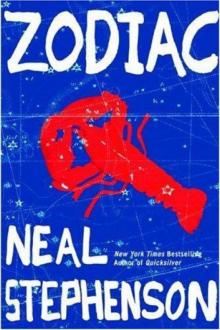 Zodiac: The Eco-Thriller
Zodiac: The Eco-Thriller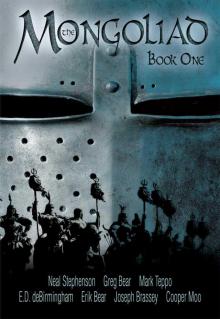 The Mongoliad: Book One
The Mongoliad: Book One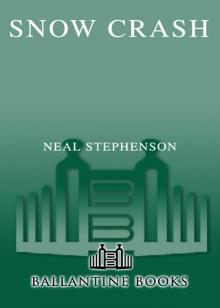 Snow Crash
Snow Crash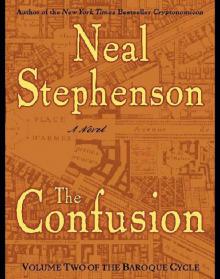 The Confusion: Volume Two of the Baroque Cycle
The Confusion: Volume Two of the Baroque Cycle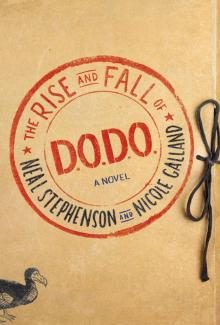 The Rise and Fall of D.O.D.O.
The Rise and Fall of D.O.D.O.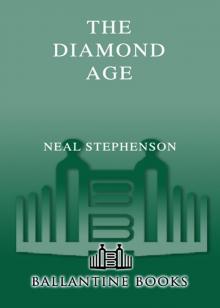 The Diamond Age: Or, a Young Lady's Illustrated Primer
The Diamond Age: Or, a Young Lady's Illustrated Primer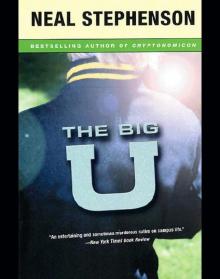 The Big U
The Big U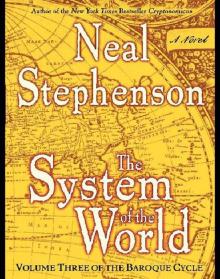 The System of the World: Volume Three of the Baroque Cycle
The System of the World: Volume Three of the Baroque Cycle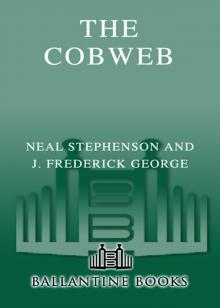 The Cobweb
The Cobweb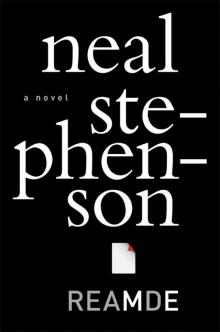 Reamde
Reamde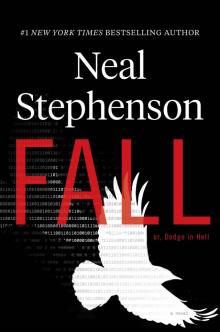 Fall; or, Dodge in Hell
Fall; or, Dodge in Hell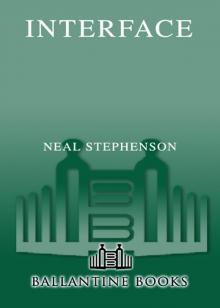 Interface
Interface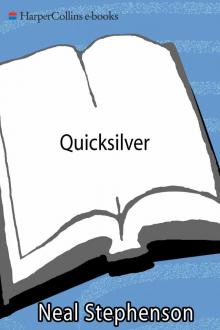 Quicksilver
Quicksilver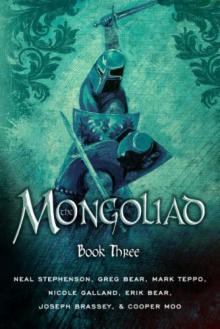 The Mongoliad: Book Three
The Mongoliad: Book Three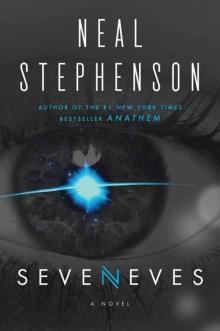 Seveneves
Seveneves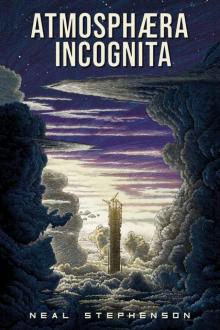 Atmosphæra Incognita
Atmosphæra Incognita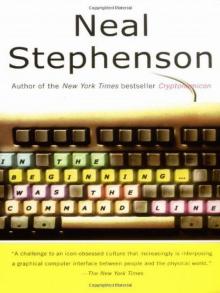 In the Beginning...Was the Command Line
In the Beginning...Was the Command Line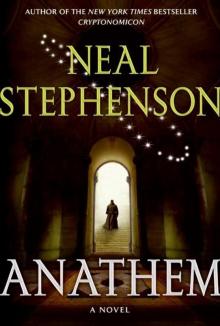 Anathem
Anathem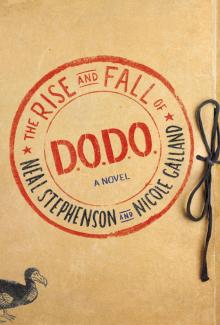 The Rise and Fall of D.O.D.O.: A Novel
The Rise and Fall of D.O.D.O.: A Novel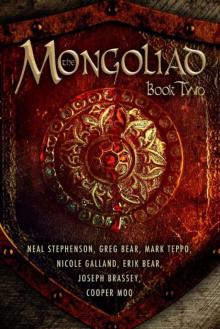 The Mongoliad: Book Two
The Mongoliad: Book Two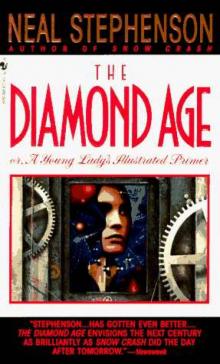 Diamond Age or a Young Lady's Illustrated Primer
Diamond Age or a Young Lady's Illustrated Primer THE System OF THE WORLD
THE System OF THE WORLD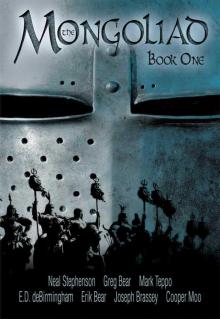 The Mongoliad: Book One tfs-1
The Mongoliad: Book One tfs-1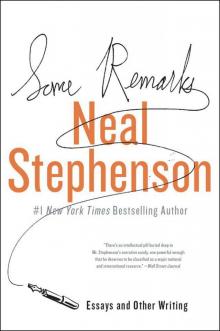 Some Remarks: Essays and Other Writing
Some Remarks: Essays and Other Writing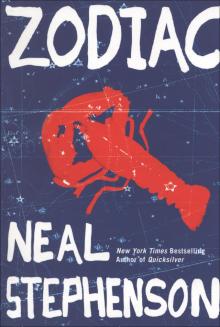 Zodiac
Zodiac Spew
Spew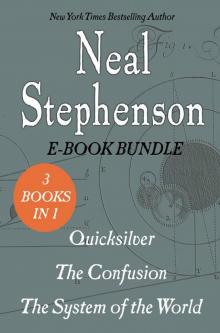 The Baroque Cycle: Quicksilver, the Confusion, and the System of the World
The Baroque Cycle: Quicksilver, the Confusion, and the System of the World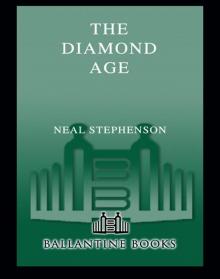 The Diamond Age
The Diamond Age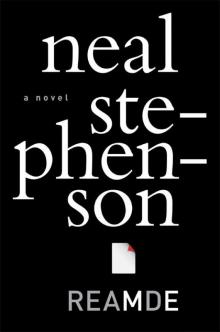 Reamde: A Novel
Reamde: A Novel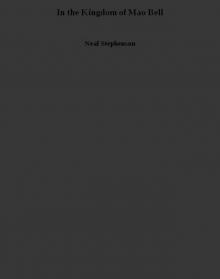 In the Kingdom of Mao Bell
In the Kingdom of Mao Bell Mother Earth Mother Board
Mother Earth Mother Board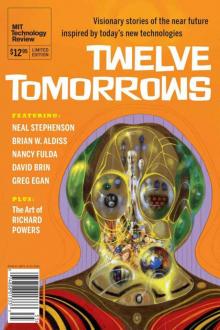 Twelve Tomorrows - Visionary stories of the near future inspired by today's technologies
Twelve Tomorrows - Visionary stories of the near future inspired by today's technologies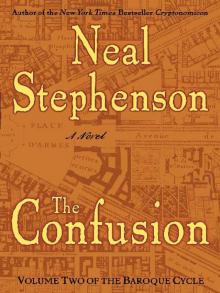 The Confusion
The Confusion The Great Simoleon Caper
The Great Simoleon Caper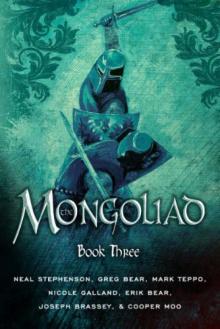 The Mongoliad: Book Three tfs-3
The Mongoliad: Book Three tfs-3